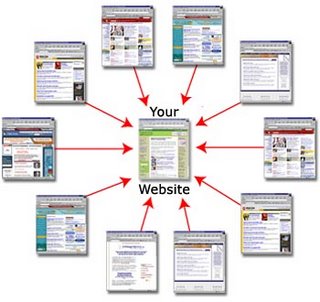
These days even the most hardcore SEO copywriter must know somewhere deep inside that on-page SEO elements are a tiny part of Google's ranking algorithm. The heart of Google's ranking algorithm is - and will remain - anchor text and inbound links.
One link per linking domain
Instead of site wide links, try getting just one or two links from those websites that choose to link to yours.
It's hard to resist the temptation to get those site wide links, but site wide links aren't exactly a normal linking pattern and may raise a red flag with Big Brother Google.
Fewer Reciprocal Links
Reciprocal links are easy to detect and may be subject to negative valuation. Try to keep your reciprocal links under 5% of your total linkage.
Varied Anchor Text
Use variations of your keywords in your anchor text. Using the exact same anchor text in the majority of your links may raise red flags insofar as natually occurring links tend to not use identical anchor text.
Varied IP's
Using dozens or even hundreds of domains on your own server and on a single Class C IP Block to create link popularity for yourself is so 2004. Move on. The search engines have figured this one out.
Related Links
If you want to rank for Web Marketing, get links from pages that talk about web marketing. Better yet, get links from pages that have web marketing in the title of the page. It works.
Link Acquisition Strategies
Submit to the major directories, such as DMOZ and Yahoo. These links may actually drive some traffic.
Second Tier Directories
There are hundreds of second tier web directories out there. Submission is sometimes just $20 or $30, so you really can't go wrong. Only pay if it's a one time fee.
Free Directories
One of the nicer things on the Internet is a free submission web directory. There are hundreds of these web directories, usually generating revenue by displaying Adsense ads. Go submit. Now. You can read the rest of this later.
Topical Directories
One of the better quality links that may give you targeted traffic is a listing in a topical web directory. If you sell widgets, go over to widget-world.com and get listing.
Related Sites
Do a search on your favorite search engine. Note the top ten websites ranking for your search term. Offer these website owners a small annual fee to have your link appear on the index pages of their websites.
Reciprocal Linking
Exchange links with a few of the better quality sites which deal with the same topics as your website.
Press Releases
New product line? Company going public? Acquired another company? Any newsworthy event you may have, do a press release and submit it through PRweb.com.
Link Conducive Content
Create useful informational pages which attract links. Offer a free tool, or advice. Forums often attract free links.
Free Stuff in Exchange for Links
Ever wonder how phpBB.com got a PageRank of ten? They gave away a script for free, with a link back to phpBB on every page. We gave away free hosting and saw some sweet PR, too.
Paid Stuff in Exchange for Links
The vast majority of vBulletin's backlinks come from paying customers using their software. Ask your customers, politely, for a link.
It doesn't have to be web related, either. Even if you sell lumber, you can ask your contractor/customers to link back to your website from theirs.
Writing Articles
Write articles. Include a link in your byline. Offer articles to related websites. Voila. Linkage.
Writing Testimonials
One great way to get links and make people happy is to give other webmasters testimonials. Do you like your web host? Neither do I, but it doesn't stop me from offering a testimonial to my web host which includes a link back to my website.
Blogs & Forums
Contribute intelligently to blog or forum discussions. Include a link to your website in your signature.
Free Hosted Doorway Pages
Create a two or three page doorway site on Geocities. Include your keywords in the page titles. Include several links to your real website with your keywords in the anchor text. Provide doorway pages with limited number of links from dubious sources.
Natural Linkage
Whatever you do, do it bigger and better than the other guys. Create content that is genuinely useful, and the links will come natually.


